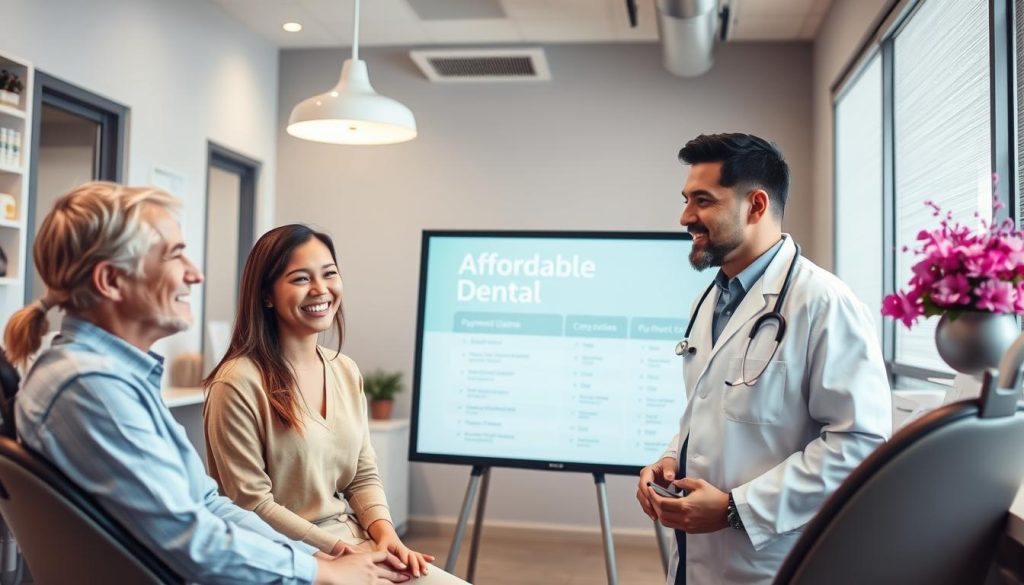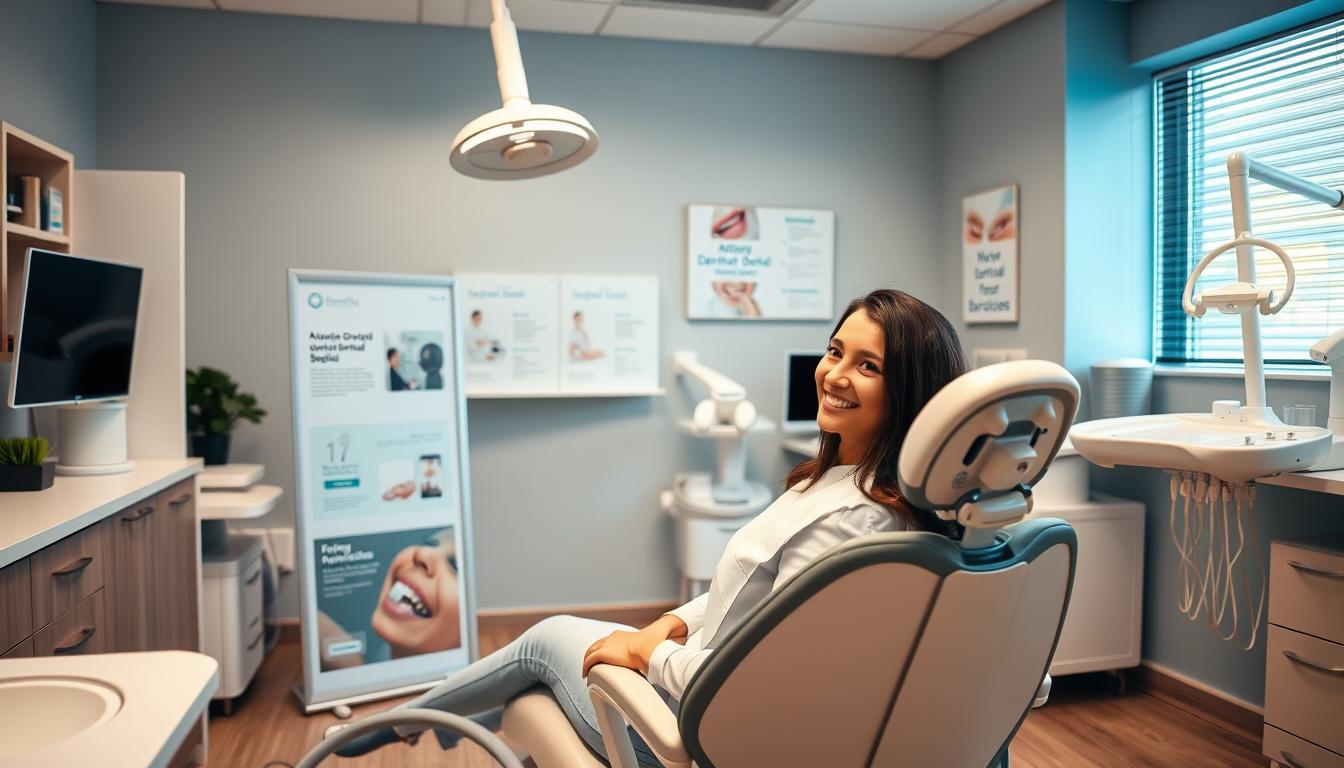Can maintaining good oral health break the bank? For many, the cost of dental care can be a significant financial burden. However, neglecting dental health can lead to even more costly problems down the line. The good news is that there are ways to keep your teeth and gums healthy without overspending.
Affordable dental care is within reach with the right strategies. By being proactive and making informed decisions, you can enjoy good oral health while staying within your budget. This article will explore practical tips for making dental care more affordable.
Key Takeaways
- Simple ways to reduce dental care costs
- Budget-friendly alternatives for dental procedures
- Tips for maintaining good oral health on a budget
- Strategies for finding affordable dental care options
- Importance of preventive dental care
Understanding the Cost of Dental Care in America
The cost of dental care in America is a significant concern for many individuals and families. Dental expenses can be overwhelming, and understanding the factors that contribute to these costs is crucial.
Why Dental Care Is Expensive
Dental care involves a range of complex procedures that require specialized training, advanced technology, and high-quality materials. The cost of these elements, combined with the need for ongoing education and training for dental professionals, contributes to the overall expense. Additionally, dental practices have overhead costs, including staff salaries, facility maintenance, and equipment expenses.
The Real Cost of Neglecting Dental Health
Neglecting dental health can lead to more severe and costly problems in the long run. Conditions such as gum disease and tooth decay can progress if not addressed promptly, requiring more extensive and expensive treatments. Investing in cost-effective dental treatments and maintaining good oral hygiene can help prevent these issues. Exploring economical dental options and considering dental savings plans can also make dental care more affordable.
By understanding the factors that contribute to the cost of dental care and the potential consequences of neglecting oral health, individuals can make informed decisions about their dental well-being and explore options for making care more affordable.
Preventive Care: Your First Line of Defense
Preventive care is the cornerstone of affordable dental health, offering numerous ways to save money in the long run. By adopting simple daily habits and investing in preventive treatments, individuals can significantly reduce their dental care expenses.
Essential Daily Habits That Save Money Long-Term
Developing good oral hygiene habits is crucial for preventing dental issues. Brushing twice a day with fluoride toothpaste and flossing daily can help remove plaque and prevent cavities. Additionally, using an antibacterial mouthwash can further reduce the risk of gum disease.
Another effective habit is to limit sugary and acidic foods and beverages, which can erode tooth enamel and lead to cavities. Regularly rinsing your mouth with water after meals can also help maintain oral health.

Preventive Treatments Worth Investing In
Investing in preventive treatments can provide long-term savings. Fluoride applications and dental sealants are effective in preventing tooth decay. Fluoride treatments strengthen tooth enamel, making teeth more resistant to decay, while dental sealants act as a barrier, protecting teeth from plaque and bacteria.
When to Schedule Regular Check-ups
Regular dental check-ups are essential for maintaining good oral health. It is generally recommended to visit the dentist every six months for a routine examination and cleaning. However, the frequency may vary based on individual oral health needs. Regular check-ups help in early detection of dental problems, reducing the need for costly treatments later on.
By combining daily habits, preventive treatments, and regular check-ups, individuals can enjoy a healthy smile while saving on dental care costs.
How to Save Money on Dental Care: Insurance and Alternatives
When it comes to saving money on dental care, knowing your insurance options and alternatives can make a significant difference. Understanding the various ways to reduce dental expenses can help individuals and families maintain good oral health without breaking the bank.
Navigating Dental Insurance Options
Dental insurance can be complex, with various plans offering different levels of coverage. To make the most of your dental insurance, it’s essential to understand the specifics of your plan, including deductibles, annual limits, and covered procedures. Choosing a plan that aligns with your dental needs can help you save money on premiums and out-of-pocket expenses. For instance, if you have regular dental check-ups, a plan with lower premiums and higher deductibles might be cost-effective.
Dental Discount Plans: A Viable Alternative
For those without traditional dental insurance, dental discount plans can be a viable alternative. These plans offer discounted rates on dental procedures in exchange for an annual fee. Dental discount plans can provide significant savings, especially for individuals with high dental expenses. It’s crucial to carefully review the terms and participating providers before enrolling in a dental discount plan.
Health Savings Accounts (HSAs) and Flexible Spending Accounts (FSAs)
Utilizing Health Savings Accounts (HSAs) or Flexible Spending Accounts (FSAs) can also help make dental care more affordable. These accounts allow you to set aside pre-tax dollars for medical and dental expenses. By using an HSA or FSA for dental expenses, you can reduce your taxable income and lower your out-of-pocket costs for dental care. It’s essential to understand the contribution limits and eligible expenses for these accounts to maximize your savings.
By exploring these options and understanding how to navigate dental insurance, individuals can make informed decisions about their dental care financing, leading to more affordable dental care and better oral health.
Affordable Dental Providers and Services
Several affordable dental providers and services can help individuals maintain good oral health without straining their finances. These options cater to various needs, ensuring that quality dental care is accessible to everyone.
Community Health Centers and Public Clinics
Community health centers and public clinics offer reduced-price dental care to those in need. These centers are funded by the government and provide a range of dental services, from routine check-ups to emergency care, at a lower cost. They are an excellent option for individuals and families who lack dental insurance or have limited financial resources.

Dental Schools: Quality Care at Reduced Rates
Dental schools are another viable option for economical dental options. These institutions offer dental care services at a reduced cost, as the procedures are performed by supervised students. While it may take longer to receive treatment, the quality of care is generally high, and patients can benefit from significantly lower costs.
Free Dental Care Events and Programs
Some communities host free dental care events and programs, providing budget-friendly oral health solutions to those who cannot afford dental care otherwise. These events may offer services such as free cleanings, fillings, and extractions. Information about these events can usually be found through local health departments or community organizations.
By exploring these affordable dental providers and services, individuals can maintain their oral health without incurring significant expenses. It’s essential to research and take advantage of these options to ensure a healthy, beautiful smile.
Managing Emergency Dental Care Costs
Managing emergency dental care costs requires a combination of preparedness and knowledge of affordable options. Dental emergencies can arise unexpectedly, and being equipped with the right information can help reduce financial stress.
Identifying True Dental Emergencies
Not all dental issues require immediate attention. Understanding what constitutes a true dental emergency can save you money. Severe toothaches, lost fillings, and broken teeth are considered emergencies, whereas minor issues can wait for a scheduled appointment.
Emergency Dental Clinics vs. Hospital ERs
Emergency dental clinics specialize in urgent dental care and are generally more cost-effective than hospital emergency rooms. Visiting an emergency dental clinic can help you save money on “emergency dental care costs.”
Creating an Emergency Dental Fund
One of the best “money-saving dental tips” is to create an emergency fund specifically for dental care. Setting aside a small amount each month can make a significant difference when unexpected dental expenses arise, allowing you to take advantage of “discounts on dental services” if available.
By being prepared and knowing your options, you can effectively manage “how to save money on dental care” during emergencies.
Negotiating and Financing Dental Treatments
Taking control of your dental expenses starts with knowing how to discuss costs with your dentist. Being open about your financial constraints can lead to cost-effective dental treatments. It’s about finding a mutually beneficial solution.
How to Discuss Costs with Your Dentist
Start by being transparent about your budget and asking if there are any economical dental options available. Discussing costs upfront can help you avoid unexpected expenses. Your dentist may offer alternative treatments or payment plans.

Payment Plans and Financing Options
Many dental offices offer financing options or payment plans to make treatments more affordable. These plans can help spread the cost over time, making it more manageable. Be sure to ask about any interest rates or fees associated with these plans.
Price Shopping for Dental Procedures
It’s also a good idea to compare prices for dental procedures among different providers. Some dentists may offer more competitive pricing for certain treatments. Researching and comparing prices can help you find the most cost-effective option.
By being proactive and informed, you can access necessary dental care without breaking the bank. Exploring your options for negotiation and financing is key to affordable dental care.
Budget-Friendly Dental Products That Actually Work
Maintaining good oral health doesn’t have to break the bank, thanks to a variety of budget-friendly dental products available today. When it comes to dental care, distinguishing between essential and luxury products can significantly impact your wallet.
Essential vs. Luxury Dental Products
Essential dental products are those necessary for maintaining good oral hygiene, such as toothbrushes, toothpaste, and dental floss. On the other hand, luxury dental products might include high-end electric toothbrushes or designer oral care accessories that aren’t crucial for oral health.
Generic vs. Brand Name: What’s Worth Paying For
Choosing between generic and brand name dental products can be challenging. Generic products often offer similar quality at a lower price. For instance, generic toothpaste with similar ingredients to brand name products can be just as effective. However, for certain products like mouthwash or specialized toothpaste, brand name options might be worth the extra cost due to their proven efficacy.
Apps and Technology for Dental Savings
Technology can also play a role in saving money on dental care. Various oral health apps can help track your brushing habits, remind you of dental appointments, and provide personalized oral care tips. Some apps even offer discounts on dental products or services.
- Look for generic or store-brand dental products.
- Utilize oral health apps for discounts and reminders.
- Invest in essential products and avoid luxury items.
Conclusion: Balancing Cost and Care for Optimal Dental Health
Maintaining good oral health doesn’t have to break the bank. By understanding the cost of dental care and exploring affordable options, individuals can save money without compromising on quality.
Implementing preventive care habits, such as regular brushing and flossing, can significantly reduce the need for costly dental procedures. Additionally, exploring dental insurance options and dental savings plans can help make dental care more affordable.
By being proactive about dental health and taking advantage of affordable dental care options, individuals can achieve optimal oral health while staying within their budget. This approach enables individuals to prioritize their health without incurring unnecessary expenses, ultimately leading to a healthier, happier smile.
To save money on dental care, it’s essential to be informed and proactive. By combining the strategies outlined in this article, individuals can enjoy quality dental care at a price they can afford, ensuring a lifetime of healthy smiles.

Leave a Reply